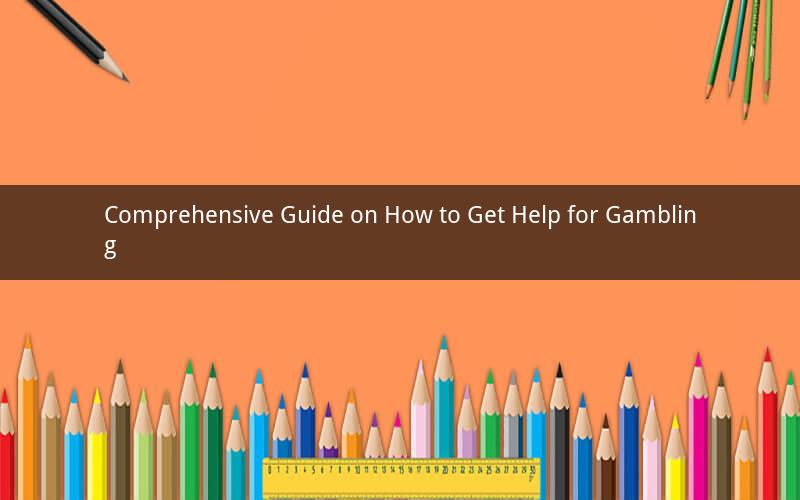
Introduction:
Gambling addiction is a serious issue that affects millions of people worldwide. It can lead to various negative consequences, including financial, emotional, and social problems. If you or someone you know is struggling with gambling addiction, it's crucial to seek help. This article provides a comprehensive guide on how to get help for gambling, including understanding the addiction, finding support, and taking steps towards recovery.
Understanding Gambling Addiction:
1. What is gambling addiction?
Gambling addiction, also known as compulsive gambling or problem gambling, is a progressive addiction characterized by an inability to control or stop gambling despite negative consequences. It is a mental health disorder that can affect anyone, regardless of age, gender, or socioeconomic status.
2. Signs of gambling addiction:
- Continuously increasing the amount of money or time spent on gambling.
- Feeling restless or irritable when attempting to cut down or stop gambling.
- Returning to gambling with the hope of winning back lost money.
- Using gambling as a way to escape problems or negative emotions.
- Lying to family, friends, or healthcare professionals about gambling activities.
Finding Support:
1. Seek professional help:
If you suspect that you or someone you know has a gambling addiction, it is essential to seek professional help. A mental health professional, such as a therapist or counselor, can provide personalized support and treatment. They can help you understand the addiction, develop coping strategies, and address underlying issues contributing to the gambling problem.
2. Join a support group:
Support groups, such as Gamblers Anonymous or Gam-Anon, offer a safe and supportive environment for individuals struggling with gambling addiction. These groups provide an opportunity to share experiences, learn from others, and receive encouragement. Attending regular meetings can be a valuable part of the recovery process.
3. Reach out to family and friends:
Family and friends can play a significant role in supporting someone with a gambling addiction. Encourage them to seek information and resources on gambling addiction, and encourage open communication. It's important to offer empathy, understanding, and support without enabling the addictive behavior.
4. Utilize online resources:
The internet offers numerous resources for individuals struggling with gambling addiction. Websites like Gamblers Anonymous, GamCare, and the National Council on Problem Gambling provide information, support, and tools for recovery. Online forums and chat rooms can also be helpful for connecting with others who understand the challenges of gambling addiction.
Taking Steps Towards Recovery:
1. Set clear goals:
Identify specific goals for your recovery journey, such as stopping gambling, reducing the frequency of gambling, or seeking financial counseling. Setting clear goals can help you stay focused and motivated throughout the recovery process.
2. Develop a relapse prevention plan:
Relapse is a common challenge in addiction recovery. Create a relapse prevention plan that includes identifying triggers, developing coping strategies, and seeking support when needed. Remember that relapse is not a failure but an opportunity to learn and grow.
3. Seek financial counseling:
Gambling addiction often leads to significant financial problems. Seek the help of a financial counselor or therapist who specializes in treating gambling-related financial issues. They can assist you in creating a budget, managing debt, and developing strategies for financial stability.
4. Consider treatment programs:
Depending on the severity of your gambling addiction, you may benefit from treatment programs. Inpatient or residential treatment programs provide structured support and intensive therapy. Outpatient programs offer flexibility while still providing essential support and therapy.
5. Practice self-care:
Self-care is crucial during the recovery process. Engage in activities that promote relaxation, stress reduction, and overall well-being. Exercise, meditation, and hobbies can be beneficial in maintaining a healthy lifestyle and supporting your recovery journey.
Questions and Answers:
1. Q: Can gambling addiction be cured?
A: Gambling addiction is a chronic condition, but it can be effectively managed and treated. With the right support and interventions, individuals can achieve long-term recovery.
2. Q: Is there a specific age group more prone to gambling addiction?
A: Gambling addiction can affect people of all ages, but research suggests that individuals in their late teens and early 20s may be more susceptible to developing a gambling addiction.
3. Q: Can therapy alone help with gambling addiction?
A: Therapy can be a valuable component of treating gambling addiction, but it is often most effective when combined with other interventions, such as support groups, financial counseling, and treatment programs.
4. Q: How long does it take to recover from gambling addiction?
A: The duration of recovery from gambling addiction varies for each individual. Some may experience immediate relief, while others may require ongoing support and treatment for several years.
5. Q: Can someone recover from gambling addiction without seeking professional help?
A: While it is possible for some individuals to recover from gambling addiction without professional help, seeking support from mental health professionals, support groups, and other resources can significantly improve the chances of successful recovery.